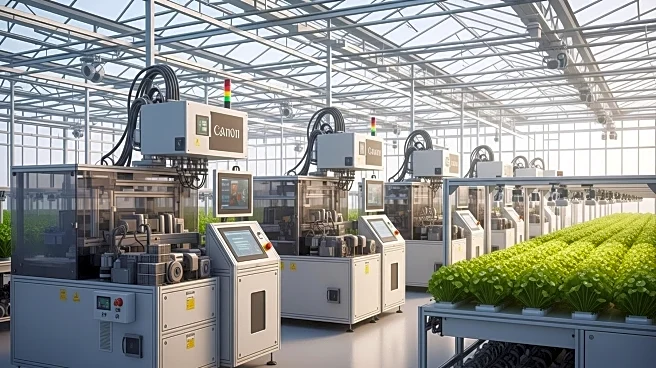What is the story about?
What's Happening?
FTI Consulting, a global business advisory firm, has identified key technological advancements in agriculture that are addressing specific challenges and driving investment. Innovations in protein production are enhancing efficiency and reducing emissions, while provenance technology is improving traceability across supply chains. Additionally, advances in precision machinery and food-tech are extending shelf life and reducing waste. These technologies are crucial in balancing consumer demands for sustainability and health outcomes with economic realities, particularly in the face of food inflation. The firm emphasizes the importance of aligning performance, taste, and sustainability to ensure viable technology adoption in the agricultural sector.
Why It's Important?
The integration of new technologies in agriculture is significant for several reasons. Firstly, it addresses environmental concerns by reducing emissions and improving supply chain traceability, which is vital for sustainable practices. Secondly, these advancements can potentially mitigate the effects of food inflation by enhancing efficiency and reducing waste, thereby lowering costs. This is crucial for maintaining affordability and accessibility of food products. Furthermore, the focus on aligning consumer demands with economic realities highlights the importance of sustainable and health-conscious choices in the market. As these technologies become more prevalent, they could lead to a shift in agricultural practices and investment strategies, benefiting both producers and consumers.
What's Next?
The ongoing development and adoption of these technologies suggest a transformative period for the agricultural industry. Stakeholders, including farmers, investors, and policymakers, may need to adapt to these changes by investing in new technologies and infrastructure. This could involve increased funding for research and development, as well as policy adjustments to support sustainable practices. Additionally, consumer education on the benefits of these technologies could play a role in driving demand for sustainably produced goods. As the industry evolves, collaboration between technology providers and agricultural businesses will be essential to maximize the benefits of these innovations.
Beyond the Headlines
The adoption of advanced agricultural technologies also raises ethical and cultural considerations. For instance, the shift towards more sustainable practices may challenge traditional farming methods and require a reevaluation of cultural norms in agriculture. Moreover, the emphasis on traceability and sustainability could lead to increased transparency in the food industry, potentially affecting consumer trust and brand reputation. Long-term, these developments could contribute to a more resilient and environmentally conscious agricultural sector, aligning with global efforts to combat climate change and promote sustainable development.















